-
Category: Environment
ITC believes that the performance of business enterprises must be measured in terms of the value they create for society. Enterprises that embed sustainability in their business strategies can deliver substantial stakeholder value through innovative development models that simultaneously create sustainable livelihood opportunities and a positive environmental footprint. The Company firmly believes that such an approach unleashes strong drivers for achieving development with social equity.
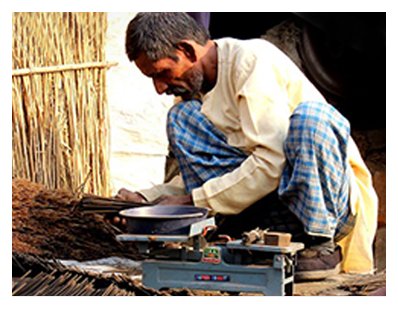
The Board of the Company has approved a CSR Policy that covers the programmes, projects and activities that the Company plans to undertake. These programmes fall within the purview of Schedule VII of the provisions of Section 135 of the Companies Act, 2013 and the Companies (Corporate Social Responsibility Policy) Rules, 2014.
The Board CSR Committee tables for the Board's approval, a CSR Plan outlining the CSR Programmes to be carried out during the financial year and the specified budgets therein. The Board deliberates and approves the CSR Plan with modifications that may be deemed necessary. The Company's Corporate Management Committee (CMC) reviews the implementation of the CSR Programmes and issues necessary directions from time to time to ensure orderly and efficient execution of CSR Programmes in accordance with this Policy. In addition, the CMC provides a status update to the CSR and Sustainability Committee on the progress in implementation of the approved CSR Programmes. The CSR and Sustainability Committee reviews such reports and keeps the Board apprised of the implementation status of the same.
Recognising that business enterprises are economic organs of society and draw on societal resources, it is ITC's belief that a company's performance must be measured by its Triple Bottom Line contribution to building economic, social and environmental capital towards enhancing societal sustainability. ITC believes that enterprises possess, beyond mere financial resources, the transformational capacity to create game-changing development models by unleashing their power of entrepreneurial vitality, innovation and creativity. In line with this belief, ITC continues to craft unique models to generate livelihoods and environmental capital. Such Corporate Social Responsibility ("CSR") projects are far more replicable, scalable and sustainable, with a significant multiplier impact on sustainable livelihood creation and environmental replenishment.
ITC believes that in the strategic context of business, enterprises possess, beyond mere financial resources, the transformational capacity to create game-changing development models by unleashing their power of entrepreneurial vitality, innovation and creativity. In line with this belief, ITC continues to craft unique models to generate livelihoods and environmental capital. Such Corporate Social Responsibility ("CSR") projects are far more replicable, scalable and sustainable, with a significant multiplier impact on sustainable livelihood creation and environmental replenishment.
| Key Stakeholders | Objectives | Strategic Interventions | Desired Outcomes |
|---|---|---|---|
| Rural households in ITC's operational areas |
|
Natural Resource Management, Integrated Animal Husbandry, Sustainable Agriculture | Sustainable & accelerated growth in livelihoods and farm incomes |
| Communities residing around ITC's factories |
|
Sustainable Livelihoods Creation, Social Infrastructure, Skilling | Dignity of life through economic & social empowerment |
| State & Central Governments | Innovate and pilot development models of excellence for replication, scale and efficient execution | Initiatives promoting national goals of poverty alleviation and environmental protection | Multi-stakeholder partnership to maximise development impact |
The ITC e-Choupal initiative is a powerful example of a business model that delivers large-scale societal value by co-creating rural markets with local communities. Recognising the various challenges faced by farmers like fragmented farms, weak infrastructure and involvement of numerous intermediaries, ITC designed e-Choupal as a more efficient supply chain aimed at delivering enhanced value to all participants in the value chain, including farmers, consumers and ITC.
With a judicious blend of click & mortar capabilities, ITC e-Choupal has triggered a virtuous cycle of higher productivity, higher incomes and enlarged capacity for farmer risk management, larger investments and higher quality and productivity.
The initiative has enhanced the competitiveness of Indian agriculture by leveraging the power of Information Technology to empower small and marginal farmers. Village internet-kiosks managed by farmers themselves, called "sanchalaks", facilitate access to information to other farmers, in their own local language. Real-time information on weather forecasts and market prices, customised knowledge on scientific farm practices and risk management are supplemented by the availability of quality farm inputs and price discovery of farm produce within the village.
A cluster of e-Choupals are supported by the integrated rural services hubs called Choupal Saagars, which serve as procurement centres, warehouses, and retail outlets. A process of engagement with rural consumers was also launched in the form of Choupal Haats, built along the lines of village fairs.
The e-Choupal network also provides on-farm agri extension services. Reaching the fruits of scientific and technological research to the farmer, demonstration farms called Choupal Pradarshan Khets have been set up to propagate best practices, while field schools enable transfer and adoption of knowledge. The programme offers other services like consultation and supervision by experts, soil testing, balanced fertilisation, foundation seeds and seed treatment, water, weed, pest and post-harvest crops management and supply of quality inputs like drought-resistant seeds to improve farm competencies.
ITC e-Choupal benefits all participants in the value chain. It enhances the ability of farmers to take informed decisions, aligns their farm output with market demand and ensure higher quality and productivity. The aggregation of demand for farm inputs from individual farmers gives them access to high quality inputs from established manufacturers at fair prices.
Traditional intermediaries, who are inducted into the e-Choupal system as "samyojaks" handle aggregation of the farm produce, and earn incomes through the logistical service they provide at the ITC procurement hubs.
For the customers of farm produce, ITC's Agri Business leverages the depth and width of the e-Choupal network to offer tailor-made solutions like multi-origin sourcing and need-specific supply chains.
ITC itself benefits from an efficient supply chain, agri raw material at lower net cost and supply of identity-preserved produce, which in turn give a competitive edge to its packaged foods business.
Launched in June 2000, ITC e-Choupal is today the largest initiative among all Internet-based interventions in rural India. Its services reach out to more than 4 million farmers in over 40,000 villages through 6,500 kiosks spread across 11 states.
The intervention is an important component of ITC's multi-dimensional Integrated Rural Development Programme that has evolved from its deep understanding of the challenges and opportunities inherent in the farm sector. The strategy of this programme, apart from empowering farmers and raising rural incomes through ITC e-Choupal, also aims at generation of supplementary income and natural resource augmentation. Initiatives such as Livestock Development and Women Empowerment create avenues for supplementary non-farm incomes to protect against agri-income volatility as well as build capacities for investment. The Watershed Development as well as Afforestation Programmes augment natural resources to enable higher productivity, create a green cover and restore soil health. The Swasthya Choupal initiative focuses on enhancing awareness of maternal & child care through a network of Village Health Champions. Taken together, these initiatives under the Integrated Rural Development Programme of ITC have had a transformational impact in many areas of rural India.
ITC has put in place a mutually reinforcing CSR Programme, which has been designed to liberate even the most underprivileged and marginalised among these stakeholder groups, from the shackles of poverty and underdevelopment through economic empowerment based on grassroots capacity building. ITC is ideally positioned to respond to these challenges, given its core objective of empowering its stakeholder communities to promote sustainable livelihoods, which, in turn, is strategically aligned to the national goals of poverty eradication and environmental regeneration.
Already water-stressed and facing widespread environmental degradation, approximately two-third of the country's population is rural and dependent on agriculture and allied activities for their livelihoods. The overwhelming majority are small/marginal farmers whose only option is rain-fed agriculture. With a direct and symbiotic dependence on climate sensitive sectors, they naturally have low adaptive capacities. Stagnating productivity is exacerbated by the fragile natural resource base, fragmented land-holdings, unscientific land management practices, overuse of chemical fertilisers, falling incomes and the growing effects of climate change. Dwindling bio-mass has created pressure on fodder and energy needs for these households. Livelihood security is further constrained by limited off-farm employment options, poor infrastructure and inadequate marketing channels. These factors all combine to perpetuate a cycle of endemic poverty.
Given the geographical diversity of its stakeholder communities, ITC's main challenge is to develop models that could be replicated across locations with the flexibility to be tailored to individual community needs. These twin concerns are addressed by a faithful adherence to four fundamental tenets:
The projects promoted under the Social Investments programme, numbering 132, are spread over 14 states covering 71 districts. The interventions reach out to nearly 7 lakh households in more than 10,600 villages. Of the total projects implemented, 71% are designed for rural stakeholder households, while the balance 29% address stakeholders residing around the Company's factories. ITC's CSR programmes are spread across the states of Andhra Pradesh, Assam, Bihar, Himachal Pradesh, Karnataka, Madhya Pradesh, Maharashtra, Odisha, Rajasthan, Tamil Nadu, Telangana, Uttarakhand, Uttar Pradesh and West Bengal.
| Particulars | 2013-14 | 2014-15 |
|---|---|---|
| Projects (No) | 110 | 132 |
| States (No) | 13 | 14 |
| Districts (No) | 61 | 71 |
| Villages (No) | 9,176 | 10,621 |
| Beneficiaries (Hh - lakhs) | 6.42 | 6.70 |
Targeted at small and marginal landholders from economically weaker sections of the society, the Social Forestry programme is designed to promote livelihoods through plantations by providing financial, technical and marketing support.
Pulpwood plantations are being promoted in Andhra Pradesh and Telangana in the districts of Khammam, Warangal, Nalgonda, Krishna, West Godavari, East Godavari and Visakhapatnam. Energy plantations, to meet the fuel and fodder needs of farmers, were promoted in the districts of Guntur, Prakasam and Nellore of AP and Chamarajanagar, Mysore, Mandya, Hassan and Chikkaballapur districts of Karnataka.
| Activity | 2013-14 | 2014-15 | Cum to 2014-15 |
|---|---|---|---|
|
Coverage No of new villages No of new beneficiaries |
719 12,827 |
1,284 17,397 |
3,720 70,067 |
|
Plantation Area Pulpwood (ha) Energy (ha) |
12,649 1,083 |
10,109 10,246 |
54,714 12,823 |
| Saplings Planted (Lakhs) | 888 | 1,078 | 4,014 |
| Agro Forestry Area (ha) | 3,848 | 9,241 | 13,911 |
Commencing in 2001-02, the programme currently has nearly 54,714 hectares under pulpwood plantation and 12,823 hectares under energy plantation. To date, both the Farm and Social Forestry programmes have greened over 2,00,000 hectares of area that generated over 90 million person-days of employment. Since its introduction in 2011-12, the area under agro-forestry has increased rapidly covering more than four-fifths of the total eucalyptus plantations today.
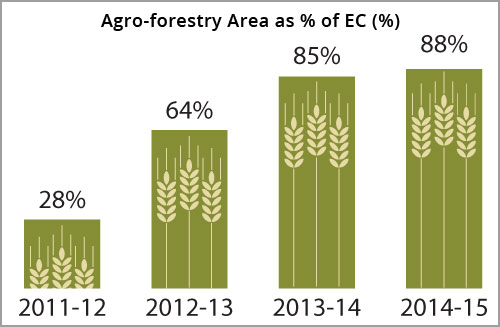
Total wood harvested during 2014-15 was 75,266 metric tonnes of which 10,629 metric tonnes were FSC 100% category wood, generating a total wealth of nearly Rs. 61 crores for poor and marginal farmers. A recent study showed that plantation incomes contributed nearly half of the total household income, representing earnings from a previously unproductive asset.
| Activity | 2013-14 | 2014-15 |
|---|---|---|
Harvest
|
1,623 2,321 60,519 2,949 20 |
2,000 3,533 75,266 6,078 13 |
| Earnings/Household (Rs.) | 1,27,067 | 1,72,036 |
| Earnings/Hectare (Rs.) | 1,81,724 | 3,03,902 |
In order to increase productivity, to give a further boost to incomes, S&MC (Soil & Moisture Conservation) measures were introduced in the Social Forestry areas. Water absorption trenches and field trench cum bunds were constructed to increase soil moisture while composting units were promoted for improving soil fertility. Nearly 1,900 hectares were treated in Khammam, Warangal, Nalgonda, East Godavari, Krishna and Nellore districts. 13 tanks were desilted and the silt excavated was applied on farmers' fields to enhance soil fertility.
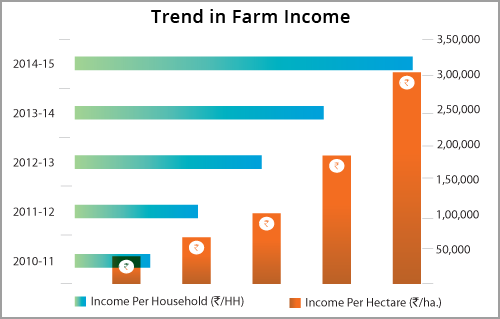
To meet the increasing demand of saplings during the planting season, women-owned subabul nurseries were established this year, which raised 30 lakh saplings for the Social Forestry programme. Training was also given to the women members on bamboo nursery raising.
The Company's Watershed Development Programme promotes local management of water resources by facilitating community-based participation in planning and executing watershed projects for the small and marginal farmers who are almost entirely dependent on common property resources, including water.
Commencing in 2000-01, the programme is currently spread across 1,182 villages in Andhra Pradesh, Bihar, Karnataka, Madhya Pradesh, Maharashtra, Odisha, Rajasthan, Tamil Nadu and Telangana. During 2014-15, 51,397 hectares were brought under watershed development, the highest ever since the inception of the programme. With this the total area covered to date has crossed the 2 lakh hectares mark. Cumulatively 6,464 water-harvesting structures have been constructed, thus creating fresh water storage capacity of 24.97 Million Kl.
| Activity | 2013-14 | 2014-15 | Cum to 2014-15 |
|---|---|---|---|
|
Water-harvesting Minor Structures (No) Major Structures (No) |
533 300 |
1,159 331 |
4,135 2,329 |
| Total Structures | 833 | 1,490 | 6,464 |
|
Watershed Area Area Treated (Ha) Critical Irrigation Area (Ha) |
19,664 12,998 |
32,644 18,753 |
1,30,969 69,218 |
| Total Watershed Area | 32,662 | 51,397 | 2,00,186 |
|
Water Storage Capacity (Million Kl) Direct Beneficiaries (No) Empl mandays (lakhs) |
2.43 19,426 4.94 |
3.22 32,960 7.15 |
24.97 1,60,354 47.33 |
As part of Company's objective to create empowered village institutions that can function autonomously and play an active role in collective community action, 1,483 new Water User Groups (WUGs) have been formed till date. These groups have undergone intensive training in watershed management techniques, structure maintenance, water use regulation and formulation of user charges.
In order to improve the watershed development programme, hydro-geology was introduced as an additional feature of watershed planning in order to ensure maximum groundwater recharge based on technical and scientific assessments.
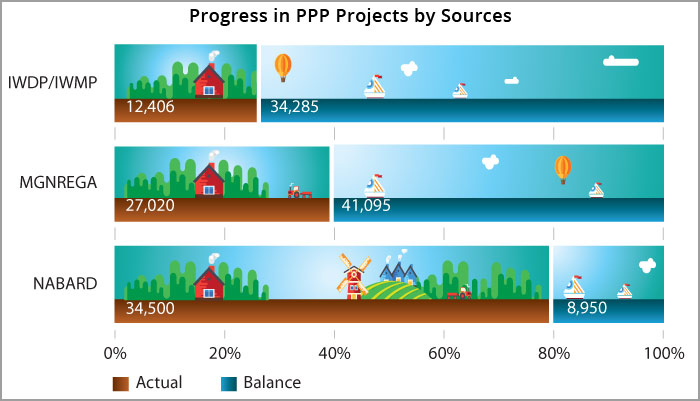
The total area to be brought under soil and moisture conservation through PPP projects currently stands at 1.58 lakh hectares. By the end of 2014-15, 79% of the total target area under the NABARD projects had been completed in Madhya Pradesh, Andhra Pradesh, Maharashtra, Rajasthan and Bihar. 34% of the target area under the IWMP/MGNREGA collaborations in Madhya Pradesh, Maharashtra and Rajasthan has been completed so far. In a major recognition of the quality of our work, the watershed development programme, being implemented in Jhalawar district of Rajasthan, has been selected by NABARD to implement the Climate Change Adaptation Programme funded by UNFCC.
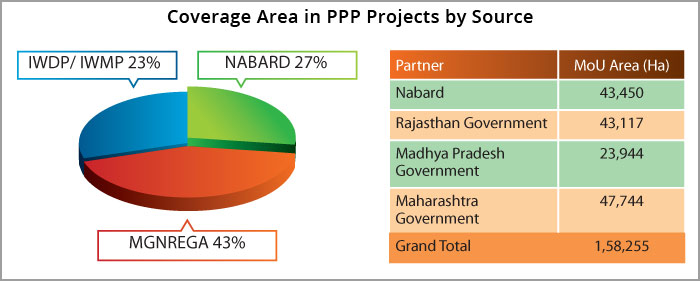
ITC's Livestock Development Programme aims to genetically upgrade low-yielding indigenous stock through artificial insemination to produce cross-bred progeny with much higher milk yields. The programme enables the most marginalised - small-holders, the landless, women-headed households and migrant groups - to convert an existing asset into a substantial supplementary income with the potential of growing into a profitable new livelihood.
| Activity | 2013-14 | 2014-15 | Cum to 2014-15 |
|---|---|---|---|
| CDC Centres (Functional Nos.) | 261 | 256 | 256 |
| Breed Improvement | |||
| No of Ais (lakhs) | 2.55 | 2.24 | 15.61 |
| No of pregnancies (lakhs) | 1.40 | 1.04 | 7.28 |
| No of calfing (lakhs) | 0.91 | 0.80 | 4.79 |
| Vaccination & Health (lakhs) | 0.14 | 0.43 | 5.46 |
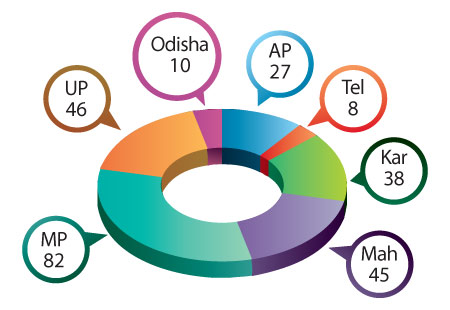
Initiated in 2003-04, there are currently 256 Cattle Development Centres (CDCs) in Andhra Pradesh, Bihar, Karnataka, Madhya Pradesh, Maharashtra, Odisha, Uttar Pradesh and Telangana. To date, 4.79 lakh cross-bred progeny have been born and animal husbandry services were provided to over 11.70 lakh breedable cattle.
CSR initiatives aimed at enhancing milk production, increasing dairy farm productivity and ensuring remunerative prices to farmers in multiple locations continued to make good progress. The Dairy Development programme is currently sourcing an average of 32,000 lpd (Litres Per Day) of milk, with a peak of 57,000 lpd, in Munger and Saharanpur from 6,470 farmers. As part of this initiative, during the year ITC also piloted an end-to-end mobile enabled farm automation and IT solution for productivity enhancement, real-time management of cattle herds' health, fertility, milk quality, productivity and providing farm management inputs to farmers, which currently covers 1,000 animals.
Intrinsically linked to ITC's watershed development programme, the core purpose of this intervention is to promote a combination of bio-mechanical solutions for optimising water management and enhancing land productivity to create a stable agricultural regime.
521 Farmer Field Schools were functional and played a pivotal role in disseminating advanced agri-practices to over 21,000 farmers through 7,736 demonstration plots covering over 18,000 hectares under different crops. 137 Agri-Business Centres rendered extension services and technical knowhow on advanced package of practices to over 15,000 farmers. Promotion of sprinklers received special focus, especially in Madhya Pradesh, with 499 units established during the year. In pursuit of ITC's long term sustainability objective of increasing soil organic carbon, 3,668 compost units were constructed during the year thus taking the cumulative total to 23,554.
| Activity | 2013-14 | 2014-15 | Cum to 2014-15 |
|---|---|---|---|
| Minor Irrigation | |||
| Group Irrigation (No) | 115 | 58 | 670 |
| Sprinklers (No) | 385 | 879 | 2,068 |
| Sustainable Agriculture | |||
| IPNM/Varietal Demo plots (Nos.) | 14,695 | 7,736 | 34,078 |
| IPNM/Varietal Demo Area (Ha.) | 6,194 | 2,717 | 11,843 |
| Compost Units (Nos.) | 5,440 | 3,668 | 23,554 |
| Farmer Field Schools (Functional Nos.) | 284 | 521 | 521 |
| Farmer Field Students (Functional Nos.) | 5,562 | 21,064 | 21,064 |
| Agri Business Centres | |||
| No of ABCs (Functional Nos.) | 88 | 137 | 137 |
| Farmers Serviced (No) | 2,447 | 15,454 | 15,454 |
In addition, Choupal Pradarshan Khets promoted field demonstrations of seed varieties and production practices for improved yield and quality in soybean, wheat, rice, summer pulses and horticultural crops in more than 1,200 villages covering around 21,000 hectares and more than 60,000 farmers. The focus of these demonstrations was on sustainable farm practices like moisture conservation, promotion of bio-fertilisers, zero-tillage, prophylactic pest management, etc.
Habitats around industrial clusters are typically overcrowded and congested. Infrastructure is poor or creaking under the pressure of an increasing population base, drawn to such regions in the hope of gainful employment. Sanitary facilities are almost non-existent creating unhygienic conditions which have a direct bearing on high morbidity rates, especially among women, a distinctive trait in such settlements.
The primary focus in the catchment of our factories is to create the necessary and enabling pre-conditions for future growth and prosperity of households living below the poverty line (BPL). A few of the fundamental causes for people feeling disempowered and apathetic towards their future are lack of employment opportunities. These are aggravated by illiteracy and ill-health, which prevents them from seizing opportunities that the labour market offers because they are either unqualified or energy-deficient.
Targeting the most marginalised, BPL and SC/ST women the programme operates in the rural hinterlands of factory catchments to mobilise them to act collectively through empowered microcredit groups and/or micro-enterprises that provide them with an array of earning opportunities.
Self Help Groups (SHGs): Commencing in the year 2000, the programme currently supports 2,057 operational SHGs with over 23,000 members. A major thrust was given to financial inclusion of women members by opening bank accounts for 1,335 of them in 2014-15. Cumulatively, over 40,000 women were gainfully employed either through micro-enterprises or assisted with loans to pursue income generating activities.
Micro Enterprises: Agarbatti production, as a micro-enterprise was operational in Andhra Pradesh, Bihar, Madhya Pradesh, Uttar Pradesh, Tamil Nadu and Telangana engaging over 4,000 women in hand rolling, pedal rolling and scenting operations. By the end of 2014-15, raw batti production was 2,457 MT while the despatch of scented battis was 751 million sticks.
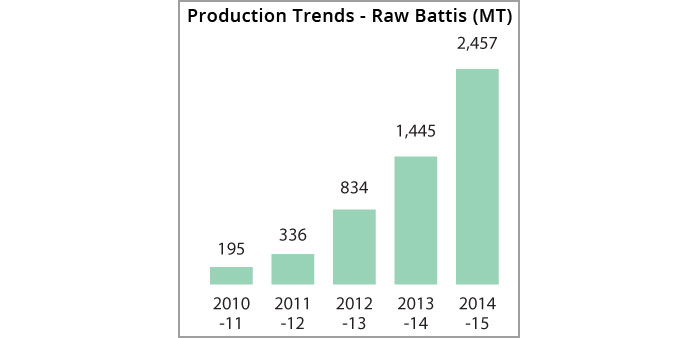
ITC's Education programme is designed to provide children from weaker sections access to education with special focus on quality and retention.
| Activity | 2013-14 | 2014-15 | Cum to 2014-15 |
|---|---|---|---|
| Education | |||
| Govt Schools Infra support (Nos.) | 47 | 147 | 1,158 |
| Children covered (Read India & SLC) | 0.30 | 0.70 | 4.06 |
| Children covered through Read India Plus (Nos.) | 0.23 | 0.36 | 0.60 |
|
Vocational Training Students enrolled (Nos.) Students placed (Nos.) |
2,443 279 |
13,180 3,280 |
19,495 4,477 |
During 2014-15, 36,000 children were covered through the Read India Programme and 34,000 children through Supplementary Learning Centres (SLCs), taking the cumulative total to 4.06 lakhs. 147 government primary schools (including Anganwadis) were provided infrastructure support comprising boundary walls, additional classrooms, sanitation units, furniture and electrical fittings, thus taking the total number of government primary schools covered till date to 1,158.
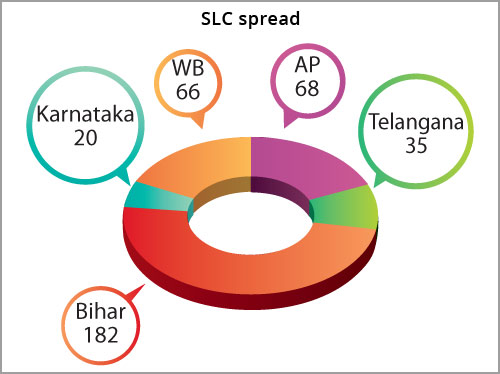
ITC's Vocational Training programme plays an active role in building and upgrading skills of marginalised youth enabling them to align better with the emerging needs of the job market. The programme focuses on building market relevant skills so as to make potential job seekers industry - ready and employable in the manufacturing, construction or service sectors.
Commencing in 2001, to date the programme has covered over 19,000 youth under different trades in Andhra Pradesh, Assam, Bihar, Himachal Pradesh, Karnataka, Maharashtra, Rajasthan, Tamil Nadu, Telangana, Uttarakhand, Uttar Pradesh and West Bengal. In 2014-15, enrolment attained an all-time high figure of 13,180 students in different trades, of which 10,378 completed training (79% of the total). The balance are in the process of completion of their training during 2015-16. Female students comprised 36% of the total enrolment and SC-ST formed 41% of the total enrolment.
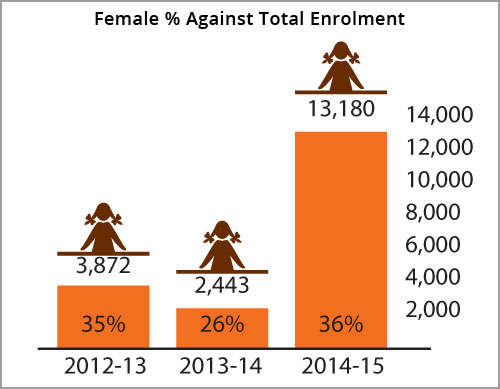
The Company continues to work with the Welcomgroup Graduate School of Hotel Administration together with Dr TMA Pai Foundation to cater to the ever growing need for professionally trained human resources in the hospitality industry. In addition, a Culinary Institute was opened in Chhindwara during 2014, to impart cooking skills to youth from the lower economic strata. Leveraging its core competencies in the FMCG sector, an employability programme to skill unemployed youth on FMCG sales and distribution was launched across various locations of the country. Candidates who successfully completed the programme were certified by the National Skill Development Corporation (NSDC) and have been gainfully employed in the FMCG sector.
In order to promote overall health and hygiene through prevention of open defecation and to reduce incidence of water-borne diseases, 8,254 individual household toilets have been constructed to date. ITC has followed a methodology of community mobilisation and contribution around factory locations of Andhra Pradesh, Bihar, Uttar Pradesh, Uttarakhand, Tamil Nadu, Telangana and Karnataka. The achievements in 2014-15 were the highest compared to all previous years. Household contribution for increased ownership, community mobilisation and awareness campaigns instilled behaviour change among the users, which will continue to be the driving force to encourage greater usage of toilets and contribute to a cleaner environment.
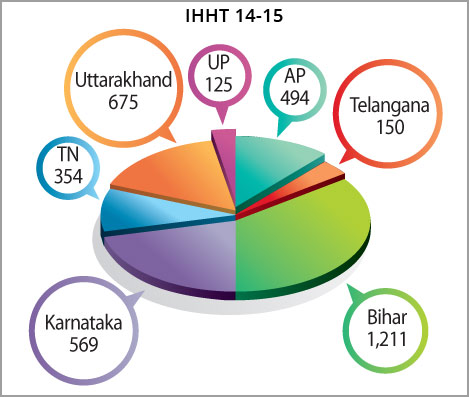
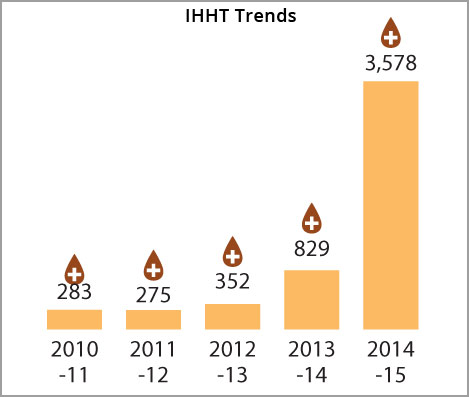
Note: IHHT - Individual Household Toilets
In areas with problems of water quality, 19 plants have been installed to provide safe drinking water to about 28,000 rural households in Andhra Pradesh. Swasthya Choupal, the Company's e-Choupal Rural Health initiative was consolidated in seven districts of Uttar Pradesh and expanded to three new districts in Madhya Pradesh with a coverage of over 450 villages.
ITC's Solid Waste Management programme, 'WOW - Well Being Out of Waste', inculcates the habit of source segregation and recycling among school children, housewives and general public as well as industries and business enterprises. The WOW movement today extends to Hyderabad, Chennai, Bengaluru, Coimbatore and some towns of Telangana, with the support of over 3 million citizens, 500,000 school children, 350 corporates, more than 1,000 commercial establishments and around 200 industrial plants. On the occasion of the 3rd anniversary of National Recycling Day, a novel pilot programme was launched in twelve selected wards of Bengaluru with the support of Bruhat Bengaluru Mahanagara Palike (BBMP). A similar pilot programme was also launched in 30 wards of Coimbatore. The pilot aims to create sustainable livelihoods for rag pickers and waste collectors by propagating source segregation at each of the households and facilitating effective collection mechanisms in collaboration with Municipal corporations. This programme is aimed at promoting a clean and green environment and providing a sustainable source of livelihood for rag-pickers and waste collectors.
| Solid Waste Management | ||||
|---|---|---|---|---|
| 2011-12 | 2012-13 | 2013-14 | 2014-15 | |
| Households Covered | 8,189 | 9,613 | 9,702 | 27,164 |
| Total Waste Collected (MT) | 1,076 | 1,498 | 2,201 | 2,717 |
| Revenue (Rs lakhs) | 38.33 | 43.91 | 53.29 | 67.07 |
| Municipal Dump | 175 | 284 | 305 | 418 |
| Municipal Dump (%) | 16% | 19% | 14% | 15% |
| Waste Handled per month (MT) | 90 | 125 | 183 | 226 |
| Revenue per month (Rs lakhs) | 3.19 | 3.66 | 4.44 | 5.59 |
A similar programme is currently active near ITC's operations in Saharanpur, Tribeni and Munger, with focus on door-to-door collection of household waste and segregation at site in order to re-cycle and compost so as to minimise the load at municipal dump sites. By end of 2014-15, the programme had covered over 27,000 households and handled 226 tonnes of waste per month, on an average. Only 15% of the total waste collected is being dumped untreated. The projects earned nearly Rs 5.58 lakhs per month as revenue which went towards meeting part of the administration and overhead costs.
ITC believes that it is necessary to represent to and engage with authorities on matters concerning the various sectors in which it operates. The Board approved Policy on Responsible Advocacy provides the framework for the necessary interface with Government/Regulatory Authorities. ITC works with apex industry institutions that are engaged in policy advocacy, like the Confederation of Indian Industry, Federation of Indian Chambers of Commerce and Industry, Associated Chambers of Commerce and Industry of India and various other forums including regional Chambers of Commerce. ITC's engagement with the relevant authorities is guided by the values of commitment, integrity, transparency and the need to balance interests of diverse stakeholders.
The Company, for its social development projects, organises meetings with the local administration and state governments to seek their participation and involvement. Their expert advice and counsel are also sought and approvals obtained, where required, for the planned interventions. The Company also engages in public-private-partnerships (PPP) with the state governments for such projects.
The CII-ITC Centre of Excellence for Sustainable Development also interacts with the Government and policy makers to promote sustainable development and inclusive growth through corporate action.
The CII-ITC Centre of Excellence for Sustainable Development, established by ITC in 2006 in collaboration with the Confederation of Indian Industry (CII), continues its endeavours to promote sustainable business practices among Indian enterprises. The Centre is steered by its Advisory Council, led by Mr Y C Deveshwar, Chairman, ITC Limited, and comprises members from industry, government, civil society and institutions, which provides strategic direction to the organisation.
During the year the Centre, in partnership with the International Integrated Reporting Council (IIRC), has set up a country-level network, the IR Lab India, to promote Integrated Reporting (IR). The objective of IR Lab is to build capacities of companies in India on integrated reporting and to represent concerns of Indian business to the IIRC.
The Centre also hosted the India Business & Biodiversity Initiative (IBBI) with the support of German International Cooperation (GIZ). Launched on the occasion of International Day for Biological Diversity on May 22, 2014, the IBBI serves as a national platform of business and its stakeholders for dialogue, sharing and learning, ultimately leading to mainstreaming sustainable management of biological diversity in businesses. The Centre and GIZ have partnered also with CREM, the Netherlands, to build capacity of member companies in biodiversity management.
In addition, at the request of the Ministry of Environment, Forest & Climate Change (MoEFCC), the Centre has drafted a single window clearance form for environment, forests and wildlife clearances with inputs from members of the CII National Committee on Environment as well as top government officials. The Centre also has been engaged with the Cabinet Secretariat's Project Management Group to suggest ways to increase transparency and accountability in the project appraisal process.
The 9th Annual Sustainability Solutions Summit continued its legacy of bringing together thought-and-action leaders from across the globe to discuss and propagate innovative and actionable solutions towards building a more sustainable future. The Centre recognises and rewards the most significant contributions to sustainable development in the country through the CII-ITC Sustainability Awards. In 2014, the Awards were presented to 27 companies.
The Centre has been building capacities of companies on the new CSR legislation as per the Companies Act 2013. In 2014, the Centre conducted seven open workshops in Delhi, Mumbai, Lucknow, Bhubaneshwar, Chennai, Vishakapatnam and Goa. The Centre is also offering services to companies in baseline studies, measurement of human development indictors, and social return on investments.
The ITC Sangeet Research Academy (ITC-SRA) is an embodiment of sustained corporate commitment to a priceless national heritage. It is a unique institution which has been at the forefront of promoting the ancient tradition of Hindustani Classical Music. Blending modern day research methods with the purity of the age old Guru-Shishya tradition, ITC-SRA is recognised as the finest repository of Hindustani Classical Music in terms of musicians, music archives and training facilities. Producing musicians of the stature of Pandit Ajoy Chakrabarty, Ustad Rashid Khan and Smt Kaushiki Desikan among many others, it has been a catalyst in ensuring the popularity of Hindustani Classical Music.
Its list of illustrious Gurus includes Vidushi Girija Devi, Ustad Abdul Rashid Khan, Pandit Buddhadev Das Gupta, Pandit Ulhas Kashalkar, Pandit Ajoy Chakrabarty, and Pandit Uday Bhawalkar. Musician Tutors (Junior Gurus) Omkar Dadarkar and Kumar Mardur are rising stars in the firmament of Hindustani Classical Music. With 53 gifted Scholars chosen from all over the country and a dedicated team of Gurus and Musician Tutors, ITC-SRA continues to passionately pursue its mission of preserving, propagating and promoting Hindustani classical music.
While relentlessly focusing on Hindustani Classical Music, the Academy has also expanded the range of its offerings to include Carnatic concerts as well. The Academy is currently engaged in carrying the message of Hindustani Classical Music across the country from the metros to rural India. Recent forays into neighbouring Bangladesh have brought home another dimension of the shared sub-continental heritage. The Academy also constantly endeavours to work together with other music organisations and institutions of repute.
The Academy continued both with its traditional programmes as well as covered new ground with fresh initiatives through 2014-15. These included Malhar offerings in August, the Arpan soiree in September, culminating in the ITC Sangeet Sammelan in December last year. In addition, collaboration with the India Habitat Centre at Delhi on the Morning Ragas series launched in October last year was extremely well received with Vidushi Girija Devi performing at the inaugural event.
The Academy's thrust in a collaborative effort to revisit Kolkata's magnificent heritage continued with programmes co-sponsored by the All Bengal Music Conference, the Bhowanipore Sangeet Sammelani, the Dover Lane Music Conference and other organisations. All India efforts to showcase the Academy's talent continued with numerous performances in Mumbai, Bangalore, Lucknow and Varanasi.
These performances served the purpose of showcasing the exceptional talent of our Scholars, Gurus and the Academy's commitment to the cause of Indian Classical music.


